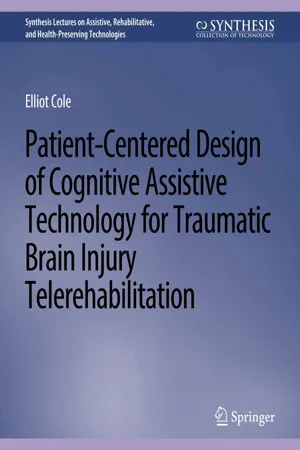
eBook - PDF
Patient-Centered Design of Cognitive Assistive Technology for Traumatic Brain Injury Telerehabilitation
- English
- PDF
- Available on iOS & Android
eBook - PDF
Patient-Centered Design of Cognitive Assistive Technology for Traumatic Brain Injury Telerehabilitation
About this book
Computer software has been productive in helping individuals with cognitive disabilities. Personalizing the user interface is an important strategy in designing software for these users, because of the barriers created by conventional user interfaces for the cognitively disabled. Cognitive assistive technology (CAT) has typically been used to provide help with everyday activities, outside of cognitive rehabilitation therapy. This book describes a quarter century of computing R&D at the Institute for Cognitive Prosthetics, focusing on the needs of individuals with cognitive disabilities from brain injury. Models and methods from Human Computer Interaction (HCI) have been particularly valuable, initially in illuminating those needs. Subsequently HCI methods have expanded CAT to be powerful rehabilitation therapy tools, restoring some damaged cognitive abilities which have resisted conventional therapy. Patient-Centered Design (PCD) emerged as a design methodology which incorporates both clinical and technical factors. PCD also takes advantage of the patient's ability to redesign and refine the user interface, and to achieve a very good fit between user and system. Cognitive Prosthetics Telerehabilitation is a powerful therapy modality. Essential characteristics are delivering service to patients in their own home, having the patient's priority activities be the focus of therapy, using cognitive prosthetic software which applies Patient Centered Design, and videoconferencing with a workspace shared between therapist and patient. Cognitive Prosthetics Telerehabilitation has a rich set of advantages for the many stakeholders involved with brain injury rehabilitation.
Frequently asked questions
Yes, you can cancel anytime from the Subscription tab in your account settings on the Perlego website. Your subscription will stay active until the end of your current billing period. Learn how to cancel your subscription.
No, books cannot be downloaded as external files, such as PDFs, for use outside of Perlego. However, you can download books within the Perlego app for offline reading on mobile or tablet. Learn more here.
Perlego offers two plans: Essential and Complete
- Essential is ideal for learners and professionals who enjoy exploring a wide range of subjects. Access the Essential Library with 800,000+ trusted titles and best-sellers across business, personal growth, and the humanities. Includes unlimited reading time and Standard Read Aloud voice.
- Complete: Perfect for advanced learners and researchers needing full, unrestricted access. Unlock 1.4M+ books across hundreds of subjects, including academic and specialized titles. The Complete Plan also includes advanced features like Premium Read Aloud and Research Assistant.
We are an online textbook subscription service, where you can get access to an entire online library for less than the price of a single book per month. With over 1 million books across 1000+ topics, we’ve got you covered! Learn more here.
Look out for the read-aloud symbol on your next book to see if you can listen to it. The read-aloud tool reads text aloud for you, highlighting the text as it is being read. You can pause it, speed it up and slow it down. Learn more here.
Yes! You can use the Perlego app on both iOS or Android devices to read anytime, anywhere — even offline. Perfect for commutes or when you’re on the go.
Please note we cannot support devices running on iOS 13 and Android 7 or earlier. Learn more about using the app.
Please note we cannot support devices running on iOS 13 and Android 7 or earlier. Learn more about using the app.
Yes, you can access Patient-Centered Design of Cognitive Assistive Technology for Traumatic Brain Injury Telerehabilitation by Elliot Cole in PDF and/or ePUB format, as well as other popular books in Computer Science & Management. We have over one million books available in our catalogue for you to explore.
Information
Table of contents
- Cover
- Copyright Page
- Title Page
- Dedication
- Contents
- Preface
- Acknowledgments
- List of Abbreviations
- Introduction
- Some Clinical Features of the Cognitive Disabilities Domain with TBI Examples
- Adapting Computer Software to Address Cognitive Disabilities
- The Primacy of the User Interface
- Patient-Centered Design
- Cognitive Prosthetics Telerehabilitation
- The Active User and the Engaged User
- Patient Case Studies in the Use of Cognitive Assistive Technology: Successes and Failures
- Conclusions, Factors Influencing Outcomes, Anomalies, and Opportunities
- Bibliography
- Author Biography